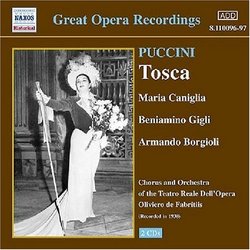| All Artists: Giacomo Puccini, Gabriel Cloez, Oliviero de Fabritiis, Maria Caniglia, Beniamino Gigli, Armando Borgioli, Arthur Endreze, Enrico di Mazzei, Ernesto Dominici, Gino Conti, Giulio Tomei, Nino Mazziotti, Ninon Vallin, Paul Payan Title: Puccini: Tosca Members Wishing: 0 Total Copies: 0 Label: Naxos Release Date: 4/16/2002 Genre: Classical Styles: Opera & Classical Vocal, Historical Periods, Modern, 20th, & 21st Century Number of Discs: 2 SwapaCD Credits: 2 UPC: 636943109625 |
Search - Giacomo Puccini, Gabriel Cloez, Oliviero de Fabritiis :: Puccini: Tosca
CD Details |
CD ReviewsTwo for the price of one. John Austin | Kangaroo Ground, Australia | 10/01/2002 (4 out of 5 stars) "Adding to their reissue series of important historical opera sets, Naxos here provides two Toscas for the price of one. Included is the complete June 1938 "Tosca", recorded in Rome, and also most of an abridged version sung in French and recorded in Paris in 1931. Fred Gaisberg, the producer of the 1938 recording has written in his autobiography of the many difficulties that beset the project. Permission was grudgingly obtained to use the vast Teatro Reale for the recording venue, but a strict time limit was imposed. Half way through the recording schedule the original Tosca, Iva Pacetti, collapsed. Maria Caniglia was summoned, at Gigli's suggestion, and the chorus, orchestra and remaining soloists began all over again. Trouble with a four-minute section of Act 1 then proved troublesome. Ten "takes" were abandoned, and a further ten the following day were attempted before a satisfactory result was obtained. Then playbacks revealed a mysterious tapping noise, traced after much searching to a tinsmith reparing part of the vast roof. Somehow the project was completed on time, and a booking made to use the same venue for a recording of "Madama Butterfly" the following year.Listening to this recording for the first time, in this 2002 reissue, I have noted several strengths and several weaknesses. The Cavaradossi, Beniamino Gigli, is the dominant singer. His Cavaradossi is essentially a light-hearted, easy-going character, a healthy and happy artist who is accidentally thrown into events and causes that kill him. Vocally, Gigli supplements his golden voice by his trick of adding aspirates at the beginning of almost every phrase. He is a master of this means of acting with the voice: to convey good humour it might be a chuckle, to convey misery it might be a gulp, and to convey anger it might be a grunt. The Tosca, Maria Caniglia, in her first complete opera recording, is a less interesting singer. Occasionally, she brings one or two dramatic moments alive in ways superior even to Callas, but she is not a Tosca to endear herself to me, especially not in her "Vissi d'arte". The Scarpia, Armando Borgioli, sings loudly throughout. A great strength in the project is the conductor Oliviero de Fabritiis, engaged for his first complete opera recording. Rarely have I been so aware of the niceties of the orchestral parts of this magnificent score. A production fault that should have been rectified occurs at the start of Act 3. A shepherd boy is heard singing, not in the distance as specified, but full blast into the microphone. The ambiance of the Teatro Reale gives richness and depth to the sound quality, but sometimes the voices catch the microphones unsympathetically. I was aware of this volume overloading in parts of the Act 1 love duet. While there are several strengths and weaknesses in this Rome production, the Paris recording boasts the inestimable strength of Ninon Vallin. Her cool, cultured and beautifully enunciated singing will quickly dispel any regrets you may have that the language used in this recording is French. Time constraints forced this condensed version to be cut further by the excision of Cavaradossi's two arias in this reissue, a loss that you will not regret when you hear the stilted, unimaginative singing of the tenor who partners Ninon Vallin."
|

